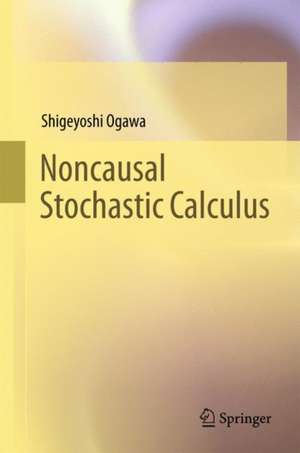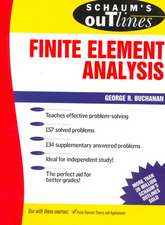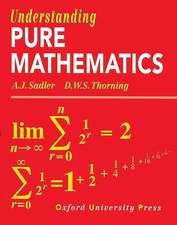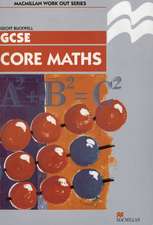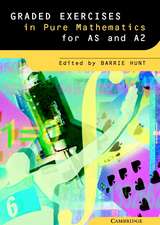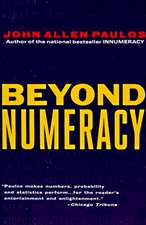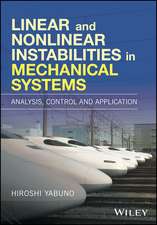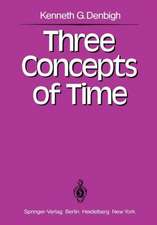Noncausal Stochastic Calculus
Autor Shigeyoshi Ogawaen Limba Engleză Hardback – 4 aug 2017
This book presents an elementary introduction to the theory of noncausal stochastic calculus that arises as a natural alternative to the standard theory of stochastic calculus founded in 1944 by Professor Kiyoshi Itô. As is generally known, Itô Calculus is essentially based on the "hypothesis of causality", asking random functions to be adapted to a natural filtration generated by Brownian motion or more generally by square integrable martingale.
The intention in this book is to establish a stochastic calculus that is free from this "hypothesis of causality". To be more precise, a noncausal theory of stochastic calculus is developed in this book, based on the noncausal integral introduced by the author in 1979.
After studying basic properties of the noncausal stochastic integral, various concrete problems of noncausal nature are considered, mostly concerning stochastic functional equations such as SDE, SIE, SPDE, and others, to show not only the necessity of such theory of noncausal stochastic calculus but also its growing possibility as a tool for modeling and analysis in every domain of mathematical sciences. The reader may find there many open problems as well.
| Toate formatele și edițiile | Preț | Express |
|---|---|---|
| Paperback (1) | 553.61 lei 38-45 zile | |
| Springer – 12 aug 2018 | 553.61 lei 38-45 zile | |
| Hardback (1) | 643.00 lei 6-8 săpt. | |
| Springer – 4 aug 2017 | 643.00 lei 6-8 săpt. |
Preț: 643.00 lei
Preț vechi: 756.47 lei
-15% Nou
Puncte Express: 965
Preț estimativ în valută:
123.04€ • 131.57$ • 102.59£
123.04€ • 131.57$ • 102.59£
Carte tipărită la comandă
Livrare economică 18 aprilie-02 mai
Preluare comenzi: 021 569.72.76
Specificații
ISBN-13: 9784431565741
ISBN-10: 4431565744
Pagini: 210
Ilustrații: XII, 210 p. 1 illus.
Dimensiuni: 155 x 235 x 18 mm
Greutate: 0.49 kg
Ediția:1st ed. 2017
Editura: Springer
Colecția Springer
Locul publicării:Tokyo, Japan
ISBN-10: 4431565744
Pagini: 210
Ilustrații: XII, 210 p. 1 illus.
Dimensiuni: 155 x 235 x 18 mm
Greutate: 0.49 kg
Ediția:1st ed. 2017
Editura: Springer
Colecția Springer
Locul publicării:Tokyo, Japan
Cuprins
1 Introduction – Why the Causality?.- 2 Preliminary – Causal calculus.- 3 Noncausal Calculus.- 4 Noncausal Integral and Wiener Chaos.- 5 Noncausal SDEs.- 6 Brownian Particle Equation.- 7 Noncausal SIE.- 8 Stochastic Fourier Transformation.- 9 Appendices to Chapter 2.- 10 Appendices 2 – Comments and Proofs.- Index.
Recenzii
“The book is well and precisely written with many details and comments. In my opinion, S. Ogawa’s book is very interesting for people working on stochastic calculus, stochastic differential equations and their applications.” (Anna Karczewska, zbMATH 1381.60003, 2018)
Textul de pe ultima copertă
This book presents an elementary introduction to the theory of noncausal stochastic calculus that arises as a natural alternative to the standard theory of stochastic calculus founded in 1944 by Professor Kiyoshi Itô. As is generally known, Itô Calculus is essentially based on the "hypothesis of causality", asking random functions to be adapted to a natural filtration generated by Brownian motion or more generally by square integrable martingale.
After studying basic properties of the noncausal stochastic integral, various concrete problems of noncausal nature are considered, mostly concerning stochastic functional equations such as SDE, SIE, SPDE, and others, to show not only the necessity of such theory of noncausal stochastic calculus but also its growing possibility as a tool for modeling and analysis in every domain of mathematical sciences. The reader may find there many open problems as well.
The intention in this book is to establish a stochastic calculus that is free from this "hypothesis of causality". To be more precise, a noncausal theory of stochastic calculus is developed in this book, based on the noncausal integral introduced by the author in 1979.
Caracteristici
Is the first book on a stochastic calculus of noncausal nature based on the noncausal stochastic integral introduced by the author in 1979 Begins with the study of fundamental properties of the noncausal stochastic integral by the author Refers to the relation with other stochastic integrals, causal or not, such as the symmetric integrals and the anticipative integral by A. Skorokhod Develops the theory along with the study of various noncausal problems in stochastic calculus, most of which are about functional equations Includes supplementary material: sn.pub/extras
